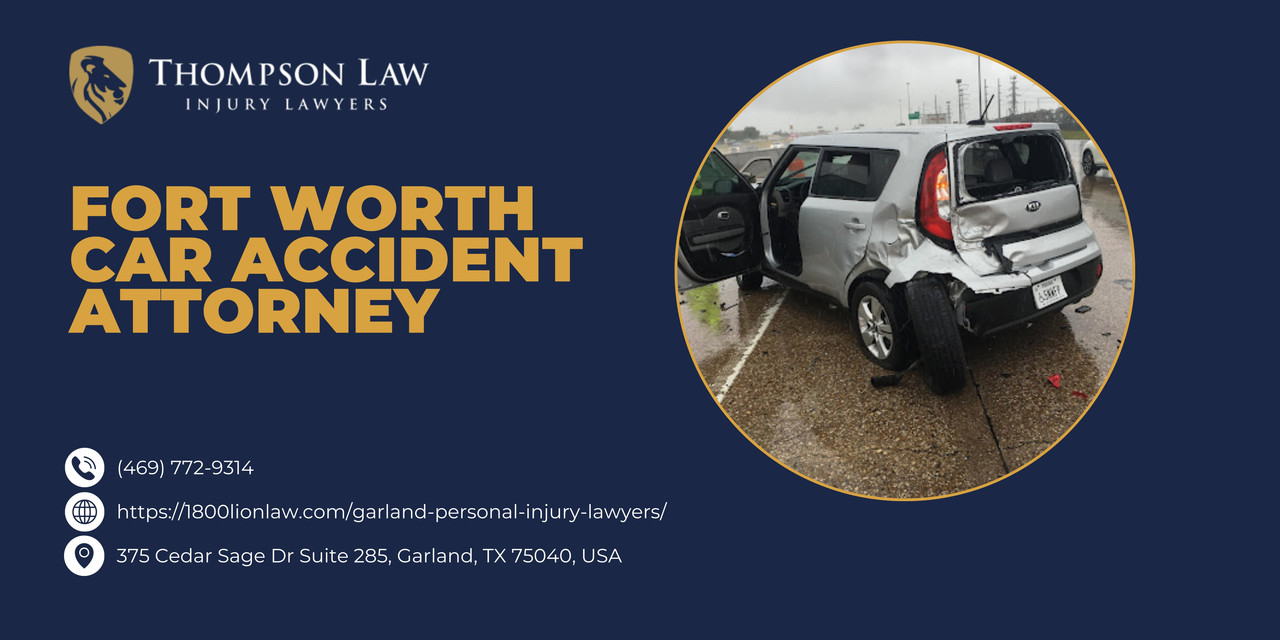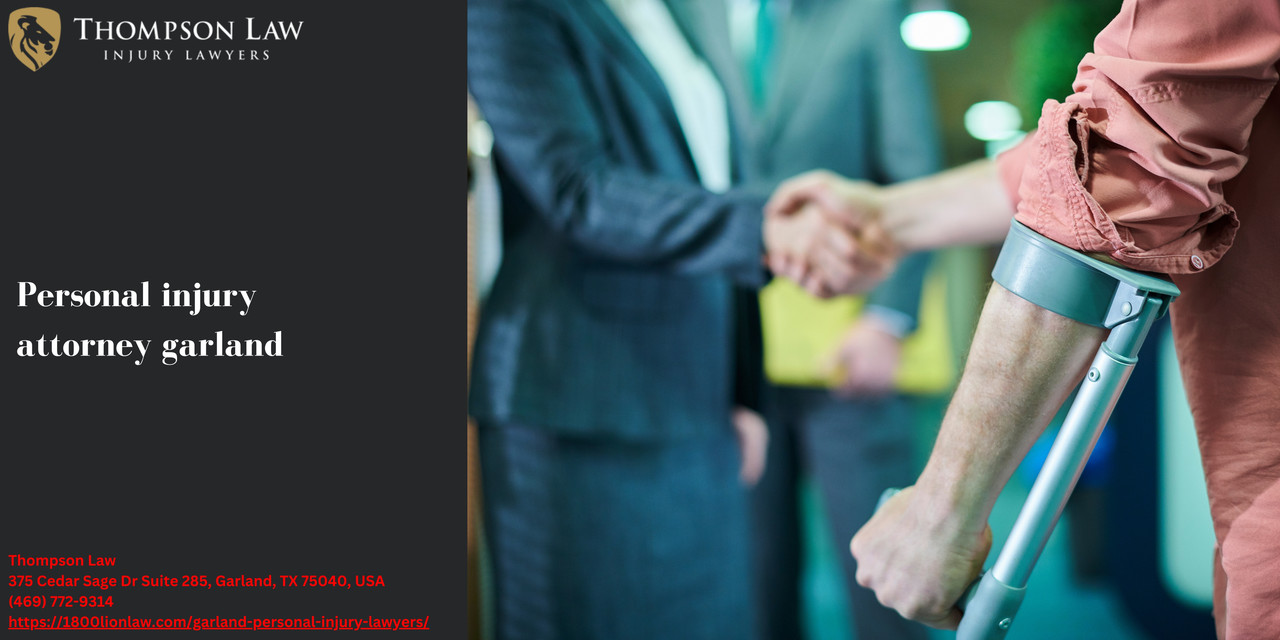Accidents happen, often when we least expect them. Whether it's a fender bender on the busy streets of Garland or a more serious collision that results in injuries, navigating the aftermath is rarely straightforward. A Garland accident lawyer serves as your guide through the legal maze, ensuring you receive the compensation you deserve. This article will delve deep into "The Legal Process Explained: How a Garland Accident Lawyer Works for You," offering insights into their roles, responsibilities, and how they can make a significant difference in your case.
Understanding the Role of a Garland Accident Lawyer
What Does a Garland Accident Lawyer Do?
A Garland accident lawyer specializes in providing legal representation for individuals injured in accidents. Their primary goal is to ensure clients receive fair compensation for their injuries and damages. They handle various cases, including car accidents, workplace injuries, slips and falls, and more.
Why Hire a Garland Accident Lawyer?
When facing an injury claim, hiring an expert like a Garland injury lawyer can be crucial. Here are some compelling reasons:
- Legal Expertise: They understand the intricacies of personal injury law. Negotiation Skills: They have experience negotiating with insurance companies. Emotional Support: They provide reassurance during stressful times.
The Initial Consultation: What to Expect
Preparing for Your First Meeting
Your first meeting with a Garland accident lawyer is essential. To maximize this consultation, consider bringing:
- Medical records Police reports Insurance documents Photos of the accident scene
Questions to Ask Your Lawyer
During this initial consultation, it’s important to ask questions such as:
What is your experience with cases like mine? How do you charge for your services? What potential outcomes do you foresee?Understanding the Legal Terminology
Common Terms You Should Know
Navigating legal jargon can be daunting. Here are some terms that frequently come up:
- Liability: The legal responsibility for causing harm. Negligence: Failure to take proper care in doing something. Settlement: An agreement reached between parties.
The Legal Process Explained: How a Garland Accident Lawyer Works for You
Step 1: Investigation of the Case
A thorough investigation is critical. Your lawyer will gather evidence, which may include:
- Witness statements Accident reports Surveillance footage
Step 2: Filing a Claim
Once sufficient evidence has been gathered, your lawyer will file a claim with the at-fault party's insurance company. This claim outlines your injuries and damages.
Step 3: Negotiations with Insurance Companies
Negotiating with insurance companies can be tricky as they often aim to minimize payouts. A skilled Garland accident lawyer knows how to advocate effectively on your behalf.
Understanding Insurance Tactics
Insurance adjusters may use various tactics to reduce claims:
Delaying communication Offering low settlements initially Questioning your injuries' severityRecognizing these tactics can help you prepare better.
Building Your Case: Evidence Collection
Types of Evidence Needed
To build a robust case, certain types of evidence are crucial:
Medical documentation detailing your injuries. Photographs from the accident scene. Expert witness testimonies if necessary.Importance of Documentation
Keeping detailed records post-accident can significantly strengthen your claim by verifying expenses related to medical treatment and lost wages.
Medical Treatment and Its Impact on Your Case
Seeking Prompt Medical Attention
After an accident, it’s vital to seek medical attention immediately—even if you feel fine initially. Some injuries may not manifest symptoms right away.
Documenting Medical Treatment
Every visit to health professionals should be documented meticulously as these records serve as critical evidence in establishing the extent of your injuries.
Understanding Compensation: What Can You Claim?
Types of Damages Available
There are two main categories of damages you may be entitled to:
Economic Damages: These include medical bills and lost wages. Non-Economic Damages: These cover pain and suffering or emotional distress.Calculating Fair Compensation
Determining what constitutes fair compensation is complex; however, factors include medical expenses, duration of recovery time, and overall impact on quality of life.
Going to Trial: When Is It Necessary?
Assessing Your Options
Most cases settle before reaching trial; however, if negotiations fail or if liability is disputed, going to trial may become necessary.
Preparing for Court
If trial becomes unavoidable:
Your attorney will present evidence supporting your claims. Witnesses may need to testify about their observations. Additionally, expert witnesses might provide testimony regarding medical implications or accident reconstruction.Frequently Asked Questions (FAQs)
1. How much does hiring a Garland accident lawyer cost?
Most personal injury lawyers work on a contingency fee basis; meaning they only get paid if you win your case—typically around 33% of any settlement or award received.
2. How long do I have to file my claim?
In Texas, there's generally a two-year statute of limitations on personal injury claims after an accident occurs; thus it's crucial not to delay seeking legal advice.

3. What if I'm partially at fault for the accident?
Texas follows modified comparative negligence laws; this means even if you're partially at fault (up to 51%), you can still recover damages—but they may be reduced according to your percentage of fault.
4. Will my case go to trial?
While many cases settle out-of-court through negotiations with insurance companies, some disputes over liability or compensation could result in going to trial; however, most attorneys strive for settlements whenever possible due to unpredictable outcomes associated with jury trials.
5. How long does it take to resolve an accident claim?
Resolution timelines vary widely based on case complexity—some settle within months while others might take years if litigation ensues; however having experienced legal representation often helps facilitate faster resolutions!

6. Can I represent myself in court?
While self-representation (pro se) is allowed technically under U.S law—it's highly discouraged due primarily because navigating complex processes without extensive knowledge increases risks substantially!
garland injury lawyerConclusion
When navigating the aftermath of an accident in Garland—having an experienced ally like a Garland accident lawyer by your side becomes invaluable! Understanding "The Legal Process Explained: How a Garland Accident Lawyer Works for You" equips you not only with knowledge but empowers you throughout each step—from investigation through negotiation or even trial should it arise!
In conclusion—don’t hesitate! Seek out professional assistance today so that you can focus on healing while knowing someone competent fights hard on behalf!
Contact Us
Thompson Law
375 Cedar Sage Dr Suite 285, Garland, TX 75040, USA
Phone: (469) 772-9314